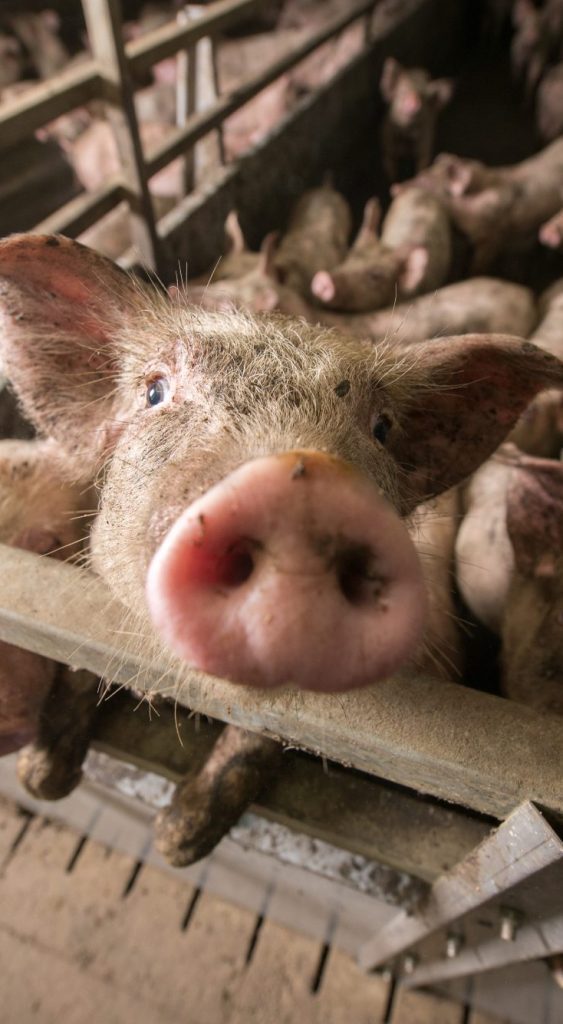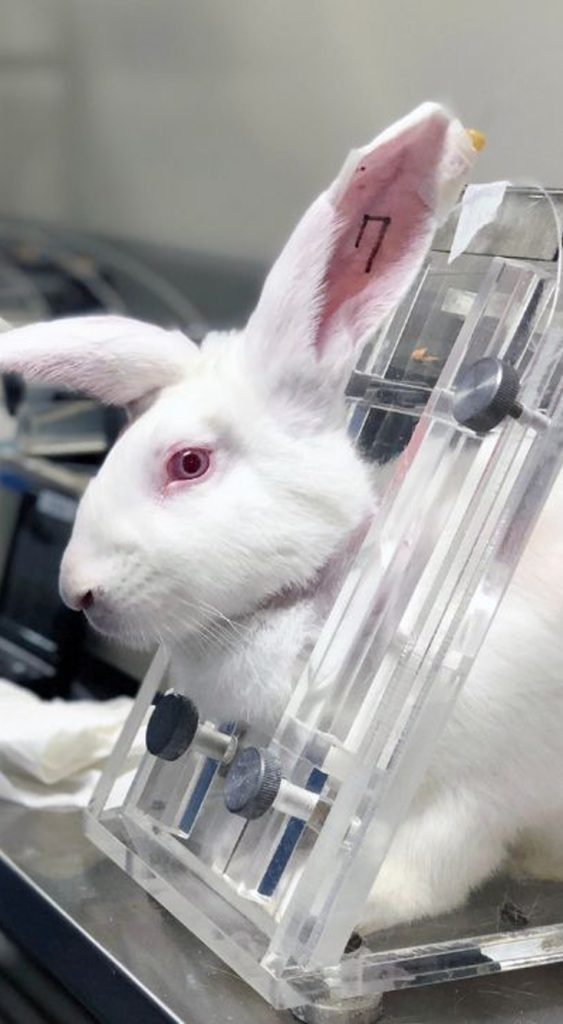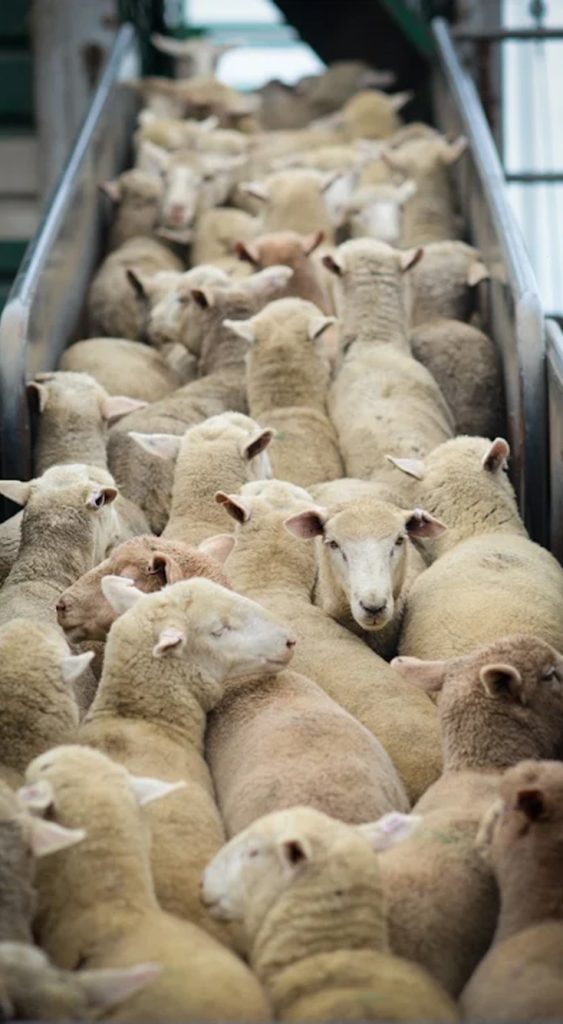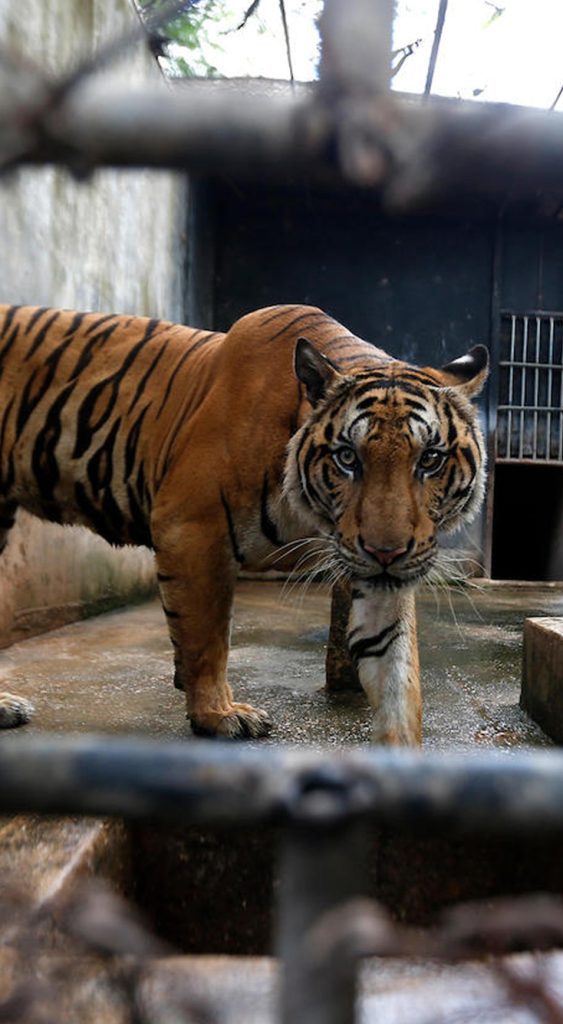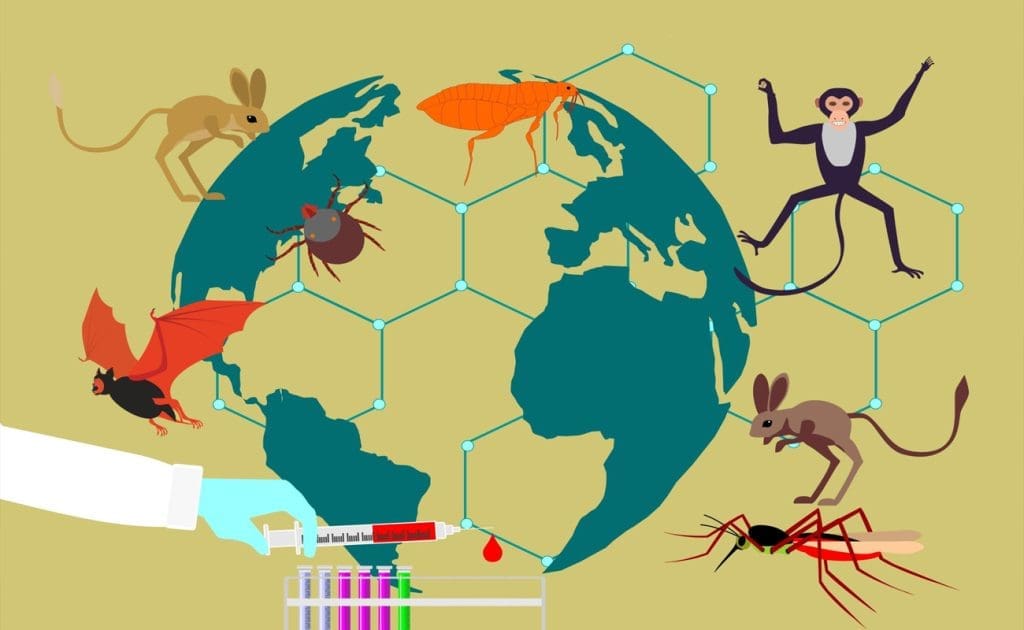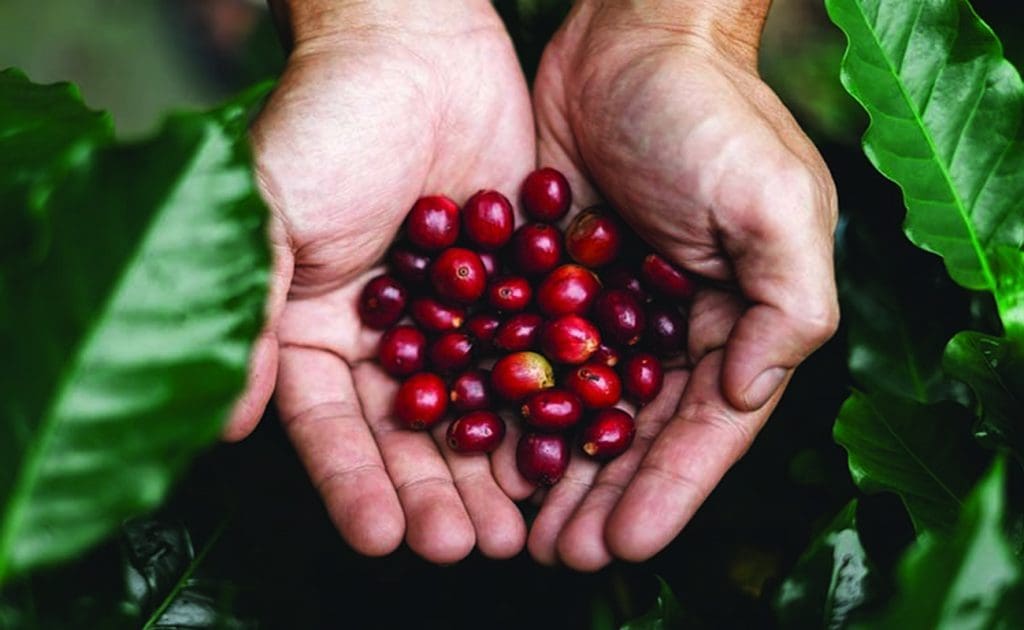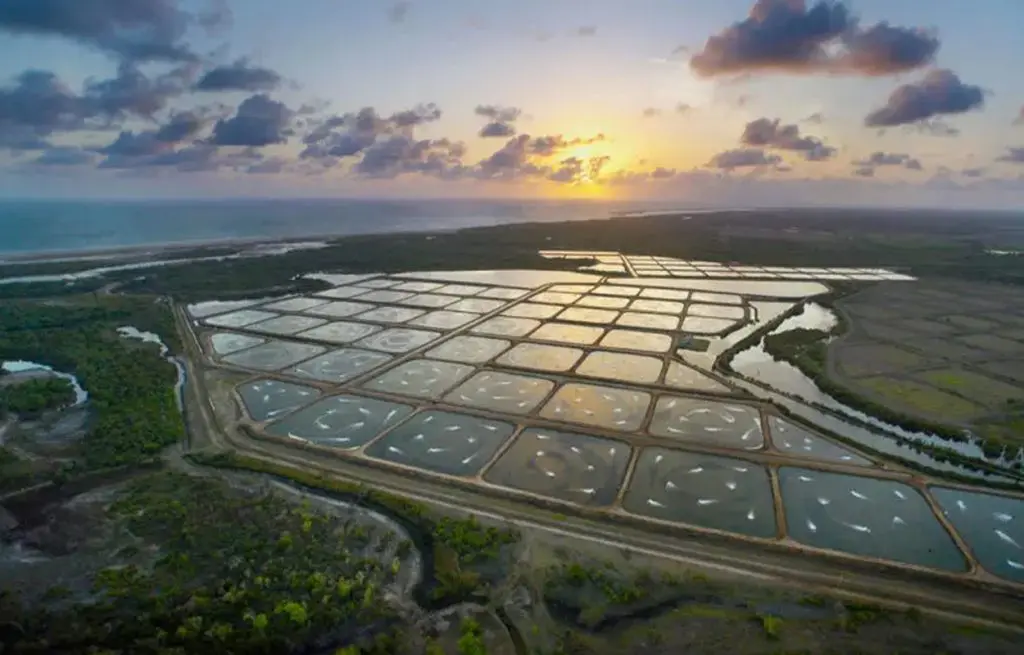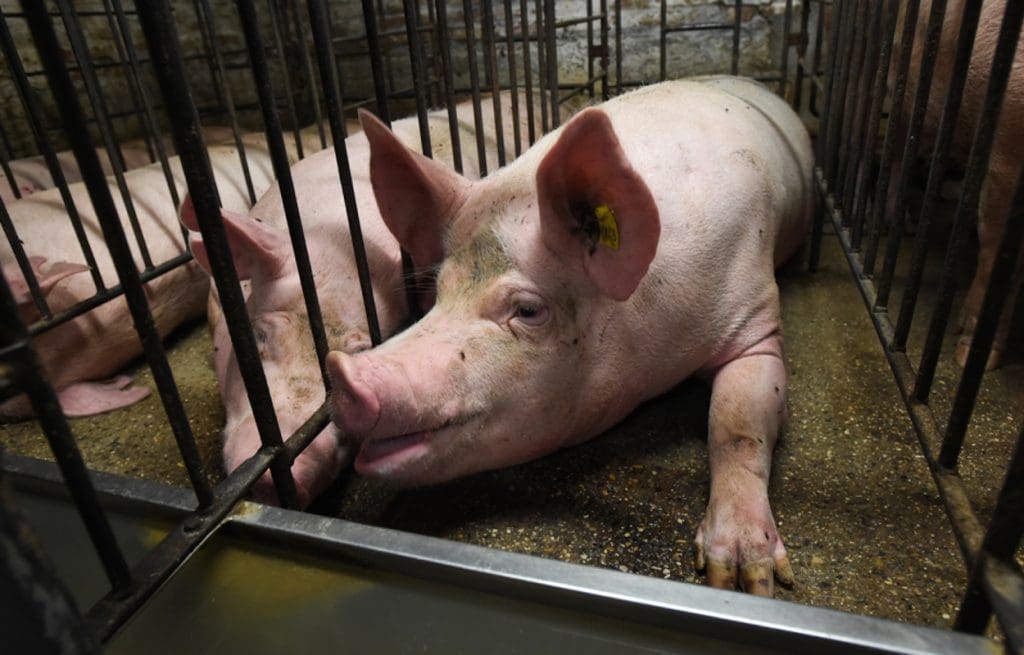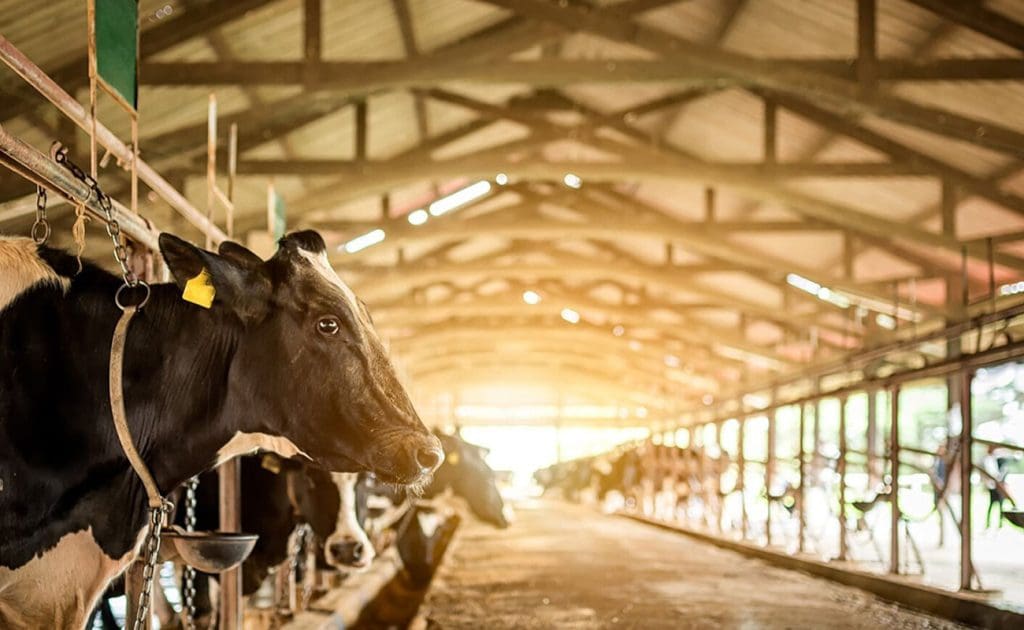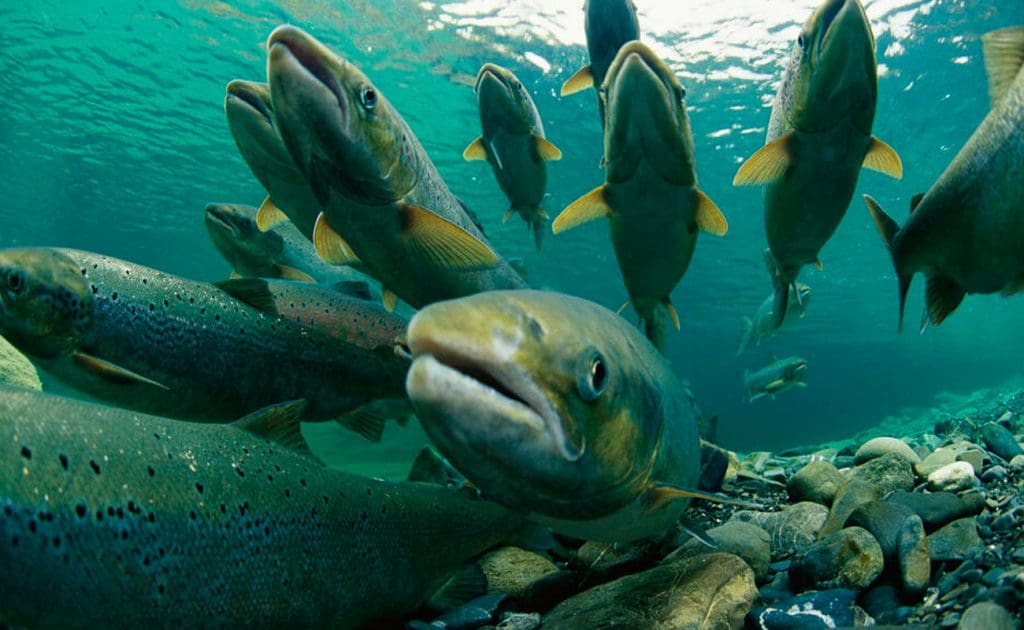
15000 litr
Suyun cəmi bir kiloqram mal əti istehsal etmək tələb olunur - heyvan kənd təsərrüfatının dünyanın şirin sularının üçdə birini necə istehlak etdiyinə dair sərt nümunədir. [1]

80%
Amazon meşəliyinin mal-qara ranching səbəbi - dünyanın ən böyük yağış meşəsinin məhv edilməsinin arxasında bir nömrəli günahkar. [2]

77%
Qlobal kənd təsərrüfatı ərazisindən heyvandarlıq və heyvan yemi üçün istifadə olunur - hələ dünyanın ən kalori və onun 37% -i proteininin yalnız 18% -ni təmin edir. [3]

Guz
Sənaye Animal Əkinçilik, bütün qlobal nəqliyyat sektorundan daha çox istixana qazları istehsal edir. [4]

92 milyard
Dünyanın torpaq heyvanları hər il yemək üçün öldürülür - və onların 99% -i fabrik təsərrüfatlarında həyatına dözür. [5]

400+ növləri
Zəhərli qazlardan və 300+ milyon ton peyin fabrik təsərrüfatları tərəfindən istehsal olunur, havanı və suyunuzu zəhərləyir. [6]

1,048 milyon ton
Taxıl hər il heyvandarlıq etməklə qidalanır - qlobal aclığı dəfələrlə bitməyə kifayət edir. [7]

37%
Metan emissiyalarının heyvan kənd təsərrüfatından gəlir - co₂, idarəetmə iqlim pozğunluğundan 80 qat daha güclü bir istixana qazı. [8]

80%
Antibiotiklərin qlobal miqyasda fabrikdə əkilmiş heyvanlarda istifadə olunur, antibiotik müqavimətini yanacaq. [9]

1 ilə 2.8 trilyon
Dəniz heyvanları hər il balıqçılıq və akvakultura ilə öldürülür - əksəriyyəti heyvan kənd təsərrüfatı statistikasında da sayılmır. [10]

60%
Qlobal biomüxtəliflik itkisi qida istehsalı ilə əlaqələndirilir - heyvan kənd təsərrüfatı ilə aparıcı sürücü olmaqla. [11]

75%
Dünyanın bitki əsaslı diyetləri qəbul etdiyi qlobal kənd təsərrüfatı ərazisinin sərbəst buraxılması - ABŞ, Çin, Çin və Avropa Birliyinin ölçüsü bir ərazinin kilidini açmaq olar. [12]

Nə edirik
Ən yaxşısı, yediyimiz yolu dəyişdirməkdir. Bitki əsaslı bir pəhriz həm planetimiz, həm də yaşadığımız müxtəlif növlər üçün daha şəfqətli bir seçimdir.

Yer kürəsini xilas etmək
Heyvanlar Kənd Təsərrüfatı, biomüxtəlifliyin itkisinin və normaların nəslinin, ekosistemlərimizə ağır bir təhlükə yaratması səbəbidir.
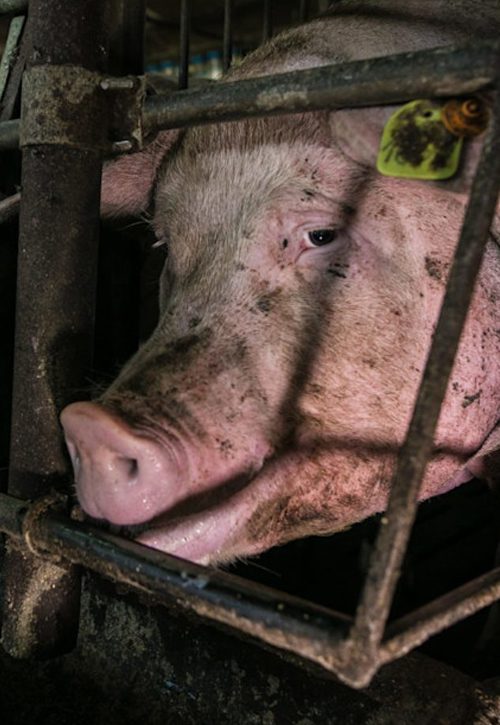
Əzablarını bitir
Zavod əkinçiliyi ət və heyvan istehsal olunan məhsullara istehlakçı tələbinə çox güvənir. Hər bitki əsaslı yemək heyvanları qəddarlıq və istismar sistemlərindən azad etməyə kömək edir.

Bitkilər üzərində inkişaf etmək
Bitki əsaslı qidalar yalnız ləzzətli deyil, həm də enerjini artıran və ümumi rifahı inkişaf etdirən zəruri vitamin və minerallarla zəngindir. Bitki ilə zəngin bir pəhrizi qucaqlamaq, xroniki xəstəliklərin qarşısını almaq və uzunmüddətli sağlamlığı dəstəkləmək üçün təsirli bir strategiyadır.
Fabrik əkinçilik qəddarlığı:
Heyvanların səssizcə əziyyət çəkdiyi yerdə biz onların səsi oluruq.
Kənd təsərrüfatında heyvanların əziyyət çəkməsi
Heyvanların göründüyü yerdə və ya səsləri eşidilmir, qəddarlıq və çempion şəfqəti ilə qarşılaşırıq. Ədalətsizliyi ifşa etmək, davamlı dəyişiklik etmək və onların rifahının təhdid edildiyi yerdə heyvanları qorumaq üçün yorulmadan çalışırıq.
Böhran
Qida sənayesimizin arxasındakı həqiqət
Qida sənayemizin arxasında duran həqiqət , milyardlarla heyvanın hər il böyük əzablara tab gətirdiyi fabrik əkinçilik qəddarlığının Heyvanların rifahına təsirindən başqa , sənaye əkinçiliyi də iqlim dəyişikliyindən biomüxtəlifliyin itməsinə qədər ekoloji ziyana Eyni zamanda, sistem piylənmə, diabet və ürək xəstəlikləri də daxil olmaqla sağlamlıq risklərinin artmasına kömək edir. Bitki əsaslı pəhriz seçmək və davamlı həyat vərdişlərini qəbul etmək güclü bir həll təklif edir - heyvanların əziyyətini , planeti qorumaq və insan sağlamlığını .
Ət sənayesi
Heyvanlar ət üçün öldürüldü
Ətləri üçün öldürülən heyvanlar doğulduqları gün əzab çəkməyə başlayırlar. Ət sənayesi ən şiddətli və qeyri-insani müalicə təcrübələri ilə əlaqələndirilir.

İnəklər
Əzaba doğulduğu, inəklər qorxu, təcrid və buynuzun aradan qaldırılması və kastrasiya kimi qəddar prosedurları, qırğın başlamazdan əvvəl.

Donuzlar
Donuzlar, köpəklərdən daha ağıllı, canlarını sıx, pəncərəsiz təsərrüfatlarda keçirin. Qadın donuzlar ən çox emprenye olaraq çoxdan əziyyət çəkir və cavanları qədər cavanları qədər də kiçik bir şeylə məhdudlaşır.

Toyuqlar
Toyuqlar fabrik əkinçiliyinin ən pisinə dözürlər. Minlərlə söküntülərə yığılmış, bədənlərinin çox sürətlə böyüməsi üçün yetişdirdikləri və ağrılı deformasiyalara və erkən ölüm üçün lider ola bilməz. Əksəriyyəti yalnız altı həftədə öldürülür.

Quzu
Quzular ağrılı bir mulilationa dözür və doğuşdan bir neçə gün sonra analarından cırılır - hamısı ət naminə. Əzabları çox erkən başlayır və çox tezliklə başa çatır.

Dovşan
Dovşanlar heç bir hüquqi müdafiəsi olmayan qəddar qətllərə zərər verir - çoxları döyülür, mizandled və boğazları hələ də şüurlu olarkən boğurlar. Onların səssiz əzabları tez-tez qeybi gedir.

Hinduşka
Hər il milyonlarla hinduşka qəddar ölümlə üzləşir, bir çoxu nəqliyyat zamanı stresdən və ya hətta kəsilmiş evlərdə canlanır. Zəka və güclü ailə istiqrazlarına baxmayaraq, səssizcə və çox sayda əziyyət çəkirlər.
Qəddarcasına
Ət sənayesi həm planetə, həm də sağlamlığımıza zərər verir.
Ətin ətraf mühitə təsiri
Yemək üçün heyvanların yetişdirilməsi böyük miqdarda torpaq, su, enerji istehlak edir və böyük ekoloji zərər verir. BMT-nin FAO, heyvan məhsulu istehlakının azaldılması mühitin dəyişməsi ilə mübarizə aparmaq üçün çox vacib olduğunu söyləyir, çünki heyvandarlıq əkinçiliyi qlobal istixana qazı tullantılarının təxminən 15% -ni təşkil edir. Zavod təsərrüfatları, həmçinin ABŞ-da 35 min mil məsafədə su yollarında qidalanma, təmizlik və içmək üçün geniş su ehtiyatlarına sahibdirlər
Sağlamlıq Riskləri
Heyvan məhsulları yemək ciddi sağlamlıq problemləri riskini artırır. Əti bir kassinogen kimi təsnifləşdirən, kolon və rektal xərçəng riskini 18% artırır. Heyvan məhsulları ürək xəstəliyi, vuruşları, diabet və xərçəng-aparıcı səbəbləri ilə əlaqəli yağlı yağlar yüksəkdir, ABŞ-da ölümcül vegetarianların daha uzun yaşayır; Bir araşdırma, ət yeyənlərlə müqayisədə altı il ərzində ölmək ehtimalı 12% az olduqlarını tapdı.
Süd sənayesi
Südün qaranlıq sirri
Hər stəkan südün arxasında əzab çəkən ana inəklərin bir dövrü, yalnız dabanları, yalnız dabanlarını götürdükləri üçün südün hamı üçün yığıla bilər.
Qırıq ailələr
Süd fermalarında analar, anbarları üçün ağlayırlar, buna görə də onlar üçün nəzərdə tutulmuş süd bizim üçün şişird ola bilər.
Təkəm
Dana, analarından yıxıldı, erkən həyatlarını soyuq izolyasiyada keçirin. Anaları sıxılmış tövlədə, səssiz əzablara dözərək, yalnız süd vermək üçün isə biz bizim üçün nəzərdə tutulmamış süd verirlər.
Ağrılı yaramazlar
Dehorning və quyruq dokunun xam əzabına qədər marka ağrısı, bu zorakı prosedurları anesteziya olmadan aparılır, inəkləri qaşınır, dəhşətə gətirir və qırılır.
Vəhşicəsinə öldürüldü
Süd üçün yetişdirilən inəklər, artıq süd vermədikləri bir dəfə çox cavan bir amansız bir sonu kəsdilər. Çoxları ağrılı səyahətlərə dözürlər və kəsmə zamanı şüurlu qalırlar, sənaye divarlarının arxasında gizlədildikləri əziyyətlər.
Qəddarcasına
Zalım süd ətrafa və sağlamlığımıza zərər verir.
Südün ekoloji dəyəri
Südlü əkinçilik, çox miqdarda metan, azotlu oksid və atmosferə zərər verən karbon qazı güclü istixana qazlarını buraxır. Həm də təbii yaşayış yerlərini əkin sahəsinə çevirərək meşəbəyi saxlayaraq yerli su mənbələrini düzgün peyin və gübrə ilə idarə etməklə sürür.
Sağlamlıq Riskləri
Süd məhsulları istehlak edən südün yüksək insulin kimi böyümə amilinin səviyyəsi səbəbindən məmə və prostat xərçəngi də daxil olmaqla ciddi sağlamlıq problemlərinin, o cümlədən səhiyyə problemlərinin daha yüksək riskləri ilə əlaqələndirilir. Kalsium güclü sümüklər üçün vacibdir, süd yeganə və ya ən yaxşı mənbə deyil; Yarpaqlı göyərti və möhkəmləndirilmiş bitki əsaslı içkilər qəddarlıqsız, sağlam alternativlər təklif edir.
Yumurta sənayesi
Qəfəsli bir toyuq həyatı
Toyuqlar ailələrinə yemək və qayğıkeşlikdən zövq alan və iki ilədək kiçik qəfəslərdə, qanadlarını yaymaq və ya təbii davranmaq olmur.
34 saat əziyyət: bir yumurtanın əsl dəyəri
Kişi cücə cull
Yumurta qoymaq və ya ət toyuqları kimi böyümək mümkün olmayan kişi balaları, yumurta sənayesi tərəfindən dəyərsiz sayılır. Hatchingdən dərhal sonra, qadınlardan ayrılırlar və amansızcasına öldürülürlər - boğulan və ya sənaye maşınlarında diri-diri qururlar.
Gərgin həbs
ABŞ-da, toyuqların təxminən 75% -i kiçik tel qəfəslərinə, hər biri printer kağızı vərəqindən daha az yer tutur. Ayaqlarına xəsarət yetirən sərt tellərdə dayanmağa məcbur olanlar, bir çox toyuq bu qəfəslərdə əziyyət çəkir və ölür, bəzən yaşayış arasında çürüməyə buraxılırlar.
Zalım xəsisliklər
Yumurta sənayesindəki toyuqlar ekstremal həbsdən ağır stress keçirir, zərərli davranışlara və cannibalizmə kimi zərərli davranışlara səbəb olur. Nəticədə, işçilər ağrıyırmadan bəzi həssas tumurcuqlarını kəsdilər.
Qəddarcasına
Yumurta sənayesi həm sağlamlığımıza, həm də ətrafımıza zərər verir.
Yumurta və ətraf mühit
Yumurta istehsalı ətraf mühitə əhəmiyyətli dərəcədə zərər verir. İstehlak olunan hər yumurta, ammiak və karbon qazı da daxil olmaqla yarım kilo istixana qazı yaradır. Bundan əlavə, yumurta əkinçiliyində istifadə olunan böyük miqdarda pestisidlər yerli su yollarında və havanı çirkləndirir, geniş yayılmış ekoloji ziyan vurur.
Sağlamlıq Riskləri
Yumurta zərərli Salmonella bakteriyalarını normal görünsə də, xəstəliklər, qızdırma, qarın ağrısı, baş ağrısı, ürək ağrısı, ürək ağrısı və qusma kimi bir xəstəlik simptomlarına səbəb olur. Zavodda əkinçilik yumurtaları tez-tez pis vəziyyətdə saxlanılır və sağlamlıq risklərini pozan antibiotiklər və hormonlar ola bilər. Bundan əlavə, yumurtada yüksək xolesterol tərkibi bəzi şəxslərdə ürək və damar problemlərinə töhfə verə bilər.
Balıqçılıq sənayesi
Ölümcül balıq sənayesi
Balıqlar ağrı hiss edir və qorumağa layiqdir, lakin əkinçilik və ya balıq ovunda qanuni hüquqları yoxdur. Sosial xarakterli və ağrı hiss etmək qabiliyyətinə baxmayaraq, onlar sadəcə mal kimi davranırlar.
Zavod balıqları
Bu gün istehlak edilən balıqların əksəriyyəti izdihamlı daxili və ya okean əsaslı Aquafarms, bütün həyatlarını yüksək səviyyəli ammiak və nitratlarla çirkli sularda məhdudlaşdırdılar. Bu sərt şərtlər, gills, orqanlarına və qanlarına, habelə geniş yayılmış bakterial infeksiyalara hücum edən tez-tez parazit infestasiyalarına səbəb olur.
Sənaye Balıqçılıq
Ticarət balıqçılıq hər il dünyada bir trilyon balıq öldürərək, çox sayda trilyon balıq öldürməyə səbəb olur. Kütləvi gəmilər, 300 metrdən yeddi mil-dən yeddi mildən yeddi mil-dən yeddi ilə uzada biləcək yüz minlərlə yemli çəngəl və gill torları ilə uzun xətlər istifadə edir. Balıqlar bu torlara kor-koranə üzür, tez-tez boğulur və ya qanaxır.
Qəddarlıq
Qanuni qoruyucu olmadan, balıqlar ABŞ-ın kəsmə evlərində dəhşətli ölümlərə məruz qalır. Sudan soyuldu, acınacaqdan yavaş-yavaş boğulan gills çökən kimi çarəsizdirlər. Daha böyük balıq-tuna, qılınc balığı-vəhşicəsinə klublu, tez-tez yaralanan, lakin hələ də şüurlu, ölümdən əvvəl təkrar zərbələrə dözməyə məcburdur. Bu amansız qəddarlıq səthin altındakı gizli qalır.
Qəddarcasına
Balıqçılıq sənayesi planetimizi viran edir və sağlamlığımıza zərər verir.
Balıqçılıq və ətraf mühit
Sənaye balıqçılıq və balıq əkinçiliyi hər iki ətraf mühitə zərər verir. Zavod balığı fermaları, geniş yayılmış ziyana səbəb olan ammiak, nitrat və parazitlərin zəhərli səviyyələri ilə su çirkləndirir. Böyük kommersiya balıqçılıq gəmiləri okean zəmini qırın, yaşayış yerlərini məhv edir və onların hasilatının 40% -ni atın, ekoloji təsiri pisləşdirir.
Sağlamlıq Riskləri
Balıq və dəniz məhsulları yemək sağlamlıq risklərini daşıyır. Tuna, qılınc balıqları, köpək balığı və mackerel kimi bir çox növ, döllərin və gənc uşaqların inkişaf edən sinir sistemlərinə zərər verə biləcək yüksək civə səviyyəsini ehtiva edir. Balıq, xərçəng və reproduktiv problemlərlə əlaqəli, diakinlər və PCB kimi zəhərli kimyəvi maddələrlə də çirklənə bilər. Bundan əlavə, tədqiqatlar göstərir ki, balıq istehlakçıları zamanla iltihab və əzələ zədələnməsinə səbəb ola biləcək minlərlə kiçik plastik hissəcikləri yeyə bilərlər.
200 heyvan.
Vegan getməklə hər il bir nəfərdən bir nəfər canını qurtara bilər.
Eyni zamanda, mal-qaranın qidalandırmaq üçün istifadə edilən taxıl, insanların qidalandırmaq üçün istifadə edildiyi təqdirdə, hər il 3,5 milyard qədər insana yemək verə bilər.
Qlobal aclığı həll etməkdə kritik bir addım.



Qəddar Həbs
Zavod təsərrüfatının reallığı
Təsərrüfat heyvanlarının təxminən 99% -i bütün həyatlarını kütləvi sənaye fabriklərində keçirir. Bu obyektlərdə minlərlə insan məftil qəfəslərə, metal yeşiklərə və ya çirkli, pəncərəsiz tövlələrdəki digər məhdudlaşdırıcı qapaqlara yığılır. Onlar kəsim məntəqələrinə aparıldıqları günə qədər ən sadə təbii davranışlardan - balalarını böyütməkdən, torpaqda yemək axtarmaqdan, yuva qurmaqdan və hətta günəş işığı və təmiz hava hiss etməkdən məhrumdurlar.
Fabrik təsərrüfatı sənayesi heyvanların hesabına maksimum qazanc əldə etmək üzərində qurulur. Qəddarlığa baxmayaraq, sistem daha sərfəli göründüyü üçün davam edir və xalqın gözündən gizlədilən heyvanların əzablarının dağıdıcı izini geridə qoyur.
Zavod fermalarında heyvanlar daimi qorxu və əzablara dözürlər:
Məkan məhdudiyyətləri
Heyvanlar çox vaxt o qədər dardırlar ki, dönə və ya uzana bilmirlər. Toyuqlar kiçik qəfəslərdə, toyuqlar və donuzlar çoxlu tövlələrdə, inəklər isə çirkli yemliklərdə yaşayır.
Antibiotik İstifadəsi
Antibiotiklər böyüməni sürətləndirir və antisanitar şəraitdə heyvanları canlı saxlayır, bu da insanlar üçün zərərli antibiotiklərə davamlı bakteriyaların inkişafına səbəb ola bilər.
Genetik manipulyasiya
Bir çox heyvan böyümək və ya daha çox süd və ya yumurta istehsal etmək üçün dəyişdirilir. Bəzi toyuqlar ayaqları üçün çox ağırlaşır, onları ac qalır və ya yemə və suya çata bilmir.
Fərq yaratmağa hazırsınız?
İnsanlara, heyvanlara və planetə əhəmiyyət verdiyiniz üçün buradasınız.

Niyə bitki əsaslı həyatı seçməlisiniz?
Daha yaxşı sağlamlıqdan daha mehriban bir planetə qədər bitki əsaslı olmağın güclü səbəblərini araşdırın. Yemək seçimlərinizin həqiqətən necə vacib olduğunu öyrənin.

Bitki əsaslı həyat tərzinə başlamaq üçün bələdçiniz
Bitki əsaslı səyahətinizə inamla və rahatlıqla başlamaq üçün sadə addımları, ağıllı məsləhətləri və faydalı resursları kəşf edin.
İnsanlar üçün
Zavod əkinçiliyindən insan sağlamlığı riskləri
Zavod əkinçiliyi insan üçün kütləvi bir sağlamlıq təhlükəsidir və diqqətsiz və murdar fəaliyyətlərdən nəticə verir. Ən ciddi məsələlərdən biri, bu fabriklərdə həddindən artıq çoxluq və stresli şəraitdə xəstəlikləri söndürmək üçün geniş yayılmış heyvandarlıqda antibiotikdir. Bu sıx istifadə, antibiotiklərə qarşı davamlı olan bakteriyaların meydana gəlməsinə səbəb olur ki, bu da yoluxmuş məhsulların istehlakı ilə birbaşa təmasdan, ya da su və torpaq kimi ətraf mühit mənbələrinə qədər olan insanlara köçürülür. Bu "Superbugs" nın yayılması, dünyanın sağlamlığı üçün böyük bir təhlükədir, çünki bu, keçmişdə müalicəyə və ya hadisəyə davamlı bir şəkildə müalicə edilə bilən infeksiyalar edə bilər. Bundan əlavə, fabrik təsərrüfatları, eyni zamanda heyvanlardan insanlara alınan və ötürülə bilən zoonotik patogen xəstəliyinin yaranması və yayılması üçün mükəmməl bir mühit yaradır. Salmonella, E. Coli və Campylobacter kimi mikroblar, yayılması, yayınma, ət, yumurta və süd məhsullarında olan xəstəliklər və baş verən xəstəliklərə səbəb olan süd, yumurta və süd məhsullarında olan çirkli fabrik təsərrüfatlarının sakinləridir. Mikrob risklərinin yanında, fabrik-əkilmiş heyvan məhsulları tez-tez doymuş yağlar və xolesterol ilə zəngindir, piylənmə, ürək-damar xəstəlikləri və tip-2 diabet kimi bir neçə xroniki xəstəliklərə səbəb olur. Bundan əlavə, mal-qarada böyümə hormonlarının həddindən artıq istifadəsi, mümkün hormonal balanssızlıqların, habelə bu məhsulları istehlak edən insanların uzunmüddətli sağlamlıq təsirləri barədə narahatlıqlar yaratdı. Zavod əkinçiliyinin yaranan ekoloji çirklənmə, həmçinin yaxınlıqdakı icmaların sağlamlığına təsir edir, çünki heyvan tullantıları, mədə-bağırsaq problemləri və digər sağlamlıq problemləri ilə nəticələnən təhlükəli nitrat və bakteriya ilə içməli suya nüfuz edə bilər. Bundan əvvəl, bu təhlükələr ictimai sağlamlığını qorumaq və daha təhlükəsiz və davamlı kənd təsərrüfatı metodlarının təşviqi üçün qidanın istehsal olunduğu yolda dərhal dəyişikliklərin zəruriliyini vurğulayır.
Son illərdə dünya zoonoz xəstəliklərin artmasının şahidi olur, Ebola, SARS və əksər...
Müasir cəmiyyətdə bitki əsaslı pəhrizə üz tutan fərdlərin sayında əhəmiyyətli dərəcədə artım olmuşdur. İstər...
Gündəlik istehlak vərdişlərimizin ətraf mühitə və heyvanların rifahına mənfi təsirləri barədə məlumatlılığın artması ilə etik...
Pəhriz seçimlərinə gəldikdə, mövcud seçimlərin çoxluğu var. Bununla belə, son illərdə...
Dəniz məhsulları uzun müddətdir ki, bir çox mədəniyyətlərin əsas məhsulu olub, sahil icmaları üçün ruzi və iqtisadi sabitlik mənbəyidir....
Müasir dünyada davamlılıq bizim dərhal diqqətimizi tələb edən aktual problemə çevrilib. Daim artan qlobal əhali ilə və...
Heyvanlar üçün
Zavod fermalarında heyvanların iztirabları
Zavod əkinçiliyi heyvanlara ağrılı, qorxu və sıxıntı hiss edə bilən, bu heyvanlara sadəcə mal kimi görünən, bu heyvanlara bənzərsiz amansızlıqlara əsaslanır. Bu sistemlərdə heyvanlar, otlaq, yuva qurma və ya ictimailəşdirmə kimi təbii davranışları yerinə yetirmək üçün çox az otaq olan, çox az bir otaq olan məhdud qəfəslərdə saxlanılır. Məhdud şərtlər ağır fiziki və psixoloji əzablara məruz qalır, yaralanır və xəsarət alır və xroniki stresin uzunmüddətli dövlətləri, təcavüz və ya özünə zərər kimi anormal davranışların inkişafı ilə xəsarət alır. Ana heyvanlar üçün məcburi olaraq reproduktiv idarəetmə dövrü sonsuzdur və övladlar analara qədər analara qədər analardan çıxarılır, həm ana, həm də cavan üçün stressi artırır. Dalzanlar tez-tez təcrid olunur və hər hansı bir sosial qarşılıqlı təsir və analarıyla bağlıdır. Quyruq doku, dezaklama, kastrasiya və dehorning kimi ağrılı prosedurlar, lazımsız əzablara səbəb olan anesteziya və ya ağrı azaldılması olmadan aparılır. Maksimum məhsuldarlıq üçün seçim - Süd inəklərində toyuq və ya daha yüksək süd məhsulu ilə daha sürətli böyümə nisbətləri, çox ağrılı olan ağır sağlamlıq vəziyyəti ilə nəticələndi: mastit, orqan çatışmazlığı, sümük deformasiyaları və s. Çirkli, izdihamlı mühit, adekvat baytarlıq olmadan xəstəliyə çox meyllidir. Günəş işığını, təmiz havanı və məkanı rədd etdikdə, qırğın gününə qədər fabrikə bənzər şərtlərdə əziyyət çəkirlər. Bu davamlı qəddarlıq etik narahatlıqları artırır, həm də ən uzaq siteden sənaye əkinçilik əməliyyatlarının heyvanları mehribanlıqla və ləyaqətlə müalicə etmək üçün hər hansı bir mənəvi öhdəliyin olduğunu vurğulayır.
Gündəlik istehlak vərdişlərimizin ətraf mühitə və heyvanların rifahına mənfi təsirləri barədə məlumatlılığın artması ilə etik...
Pəhriz seçimlərinə gəldikdə, mövcud seçimlərin çoxluğu var. Bununla belə, son illərdə...
Dəniz məhsulları uzun müddətdir ki, bir çox mədəniyyətlərin əsas məhsulu olub, sahil icmaları üçün ruzi və iqtisadi sabitlik mənbəyidir....
Son illərdə "dovşan qucaqlayan" termini heyvanların hüquqlarını müdafiə edənləri ələ salmaq və aşağılamaq üçün istifadə olunur...
Ət və süd sənayesi uzun müddətdir mübahisəli mövzu olub, onun ətraf mühitə, heyvanlara təsiri ilə bağlı müzakirələrə səbəb olub...
Okean Yer səthinin 70%-dən çoxunu əhatə edir və müxtəlif su canlılarına ev sahibliyi edir. In...
Planet üçün
Planet üçün fabrik təsərrüfatından gələn davamlılıq riskləri
Zavod əkinçiliyi, ekologiya və iqlim dəyişikliyinin pozulmasında böyük bir oyunçuya çevrilən planet və ətraf mühit üçün monumental bir risk yaradır. Güclü əkinçiliyin ən təsirli ekoloji nəticələri arasında istixana qazı tullantıları var. Xüsusilə mal-qaranın əkinçiliyi, mal-qara, kütləvi miqdarda metan - atmosferdə karbon qazı ilə müqayisədə istiliyi saxlayan güclü bir istixana qazı istehsal edir. Beləliklə, qlobal istiləşməyə töhfə verən və iqlim dəyişikliyinə sürətləndirmə təmin edən başqa bir əsas amildir. Ümumdünya, heyvan otlayan və ya heyvan yağı üçün soya və qarğıdalı kimi monokula bitkilərinin becərilməsi üçün meşə sahəsinin kütləvi təmizlənməsi, meşəliyə səbəb olan fabrik əkinçiliyinin daha güclü tərəfini təqdim edir. Planetin karbon qazını udmaq qabiliyyətini azaltmaqla yanaşı, meşələrin məhv edilməsi ekosistemləri məhv edir və saysız-hesabsız növlər üçün yaşayış yerlərini məhv edərək biomüxtəlifliyi təhdid edir. Bundan əlavə, zavod əkinçiliyi kritik su ehtiyatlarını yayındırır, çünki mal-qara üçün bu qədər su lazımdır, yem bitkiləri və tullantıların atılması üçün çox su lazımdır. Heyvan tullantılarının qeyri-müəyyən şəkildə boşaldılması, çayların, göllərin və yeraltı suları nitrat, fosfatlar və canlı orqanizmlər kimi zərərli maddələr, suyun çirklənməsinə səbəb olan zərərli maddələr və dəniz həyatının mövcud ola biləcəyi okeanlarda ölü zonaların yumurtlaması olan zərərli maddələrlə çirkləndirir. Digər bir problem, qidalanma üçün torpaq istismarının həddindən artıq istismarı üçün qida tükənməsi, eroziya və səhralaşma səbəbindən torpaq deqradasiyasıdır. Bundan əlavə, pestisidlərin və gübrələrin ağır istifadəsi, pollinator, vəhşi təbiət və insan icmalarına zərər verən ətraf ekosistemi məhv edir. Zavod əkinçiliyi yalnız dünyanın planeti üzərində sağlamlığa güzəştə getmir, eyni zamanda ətraf mühitin davamlılığı yolunda dayanan təbii sərvətlərdəki stressi də artırır. Bu məsələləri həll etmək üçün daha davamlı qida sistemlərinə keçid vacibdir, insan və heyvan rifahı və ətraf mühitin özü üçün etik mülahizələri ehtiva edir.
Gündəlik istehlak vərdişlərimizin ətraf mühitə və heyvanların rifahına mənfi təsirləri barədə məlumatlılığın artması ilə etik...
Pəhriz seçimlərinə gəldikdə, mövcud seçimlərin çoxluğu var. Bununla belə, son illərdə...
Dəniz məhsulları uzun müddətdir ki, bir çox mədəniyyətlərin əsas məhsulu olub, sahil icmaları üçün ruzi və iqtisadi sabitlik mənbəyidir....
Heyvandarlıq minilliklər boyu bəşər sivilizasiyasının mərkəzi hissəsi olub, həyati qida mənbəyidir...
Müasir dünyada davamlılıq bizim dərhal diqqətimizi tələb edən aktual problemə çevrilib. Daim artan qlobal əhali ilə və...
Cəmiyyət olaraq, ümumi sağlamlığımızı qorumaq üçün uzun müddətdir balanslı və müxtəlif pəhriz istehlak etməyi məsləhət görürük...
Şəfqətli və Davamlı Gələcəyin qurulması
- Birlikdə, heyvanların əziyyət çəkdiyi fabrik əkinçiliyinin üzləşdiyi bir gələcəyi xəyal edək ki, çoxdan yaşanan heyvanların çoxdan baş verdiyi və harada yaşananların öz əzabları üzərində bir təbəssümlə danışa biləcəyimiz bir tarixə çevrilsin Şəxslərin və planetin sağlamlığı hamımızın əsas prioritetlərindən biridir. Əkinçilik dünyada yeməklərimizi istehsal etməyin əsas yollarından biridir; Bununla birlikdə, sistem bəzi pis nəticələr gətirir. Məsələn, ağrı heyvanları təcrübəsi sadəcə dözülməzdir. Sıx, dolu boşluqlarda yaşayırlar, yəni təbii davranışlarını ifadə edə bilmədikləri və daha da pisləşdikləri deməkdir, onlar daima düşən ağrıların saysız-hesabsız hallarına məruz qalırlar. Heyvanların əkinçiliyi yalnız heyvanların əziyyət çəkmələrinin səbəbi deyil, həm də ətraf mühit və sağlamlıq radarlarda görünür. Mal-qarada antibiotiklərin həddindən artıq istifadəsi insan sağlamlığı üçün təhlükə yaradan antibiotik davamlı bakteriyaların artmasına kömək edir. İnəklər kimi heyvanlar da zərərli kimyəvi maddələrin sərbəst buraxılması səbəbindən suda çirklənmə mənbəyidir. Digər tərəfdən, istixana qazlarının kütləvi yayılması yolu ilə meşəlik əkinçiliyinin və iqlim dəyişikliyi ilə heyvan kənd təsərrüfatının artması hakim məsələdir.
- İnancımız burada olan hər bir məxluqun hörmət və ləyaqətlə təltif olunduğu bir dünyada, ilk işığın insanların hara getdiyi yerə aparır. Hökumətimizin, təhsil proqramlarımızın və strateji tərəfdaşlıq vasitəsi ilə, heyvanların köməyi ilə heyvanların çox ağrılı və qəddar rəftarı kimi həqiqəti söylədiyimiz və öldürülən heyvanların ölümünə səbəb olmadığını və ölümünə işgəncə verilməsinə səbəb oldu. Əsas diqqətimiz, insanlar üçün təhsil vermək üçün təhsil verməkdir ki, müdrik qərarlar qəbul edə bilsinlər və əslində real dəyişiklik gətirsinlər. Humane Foundation fabrik əkinçiliyi, davamlılığı, heyvan rifahı və insan sağlamlığı, insan sağlamlığı və insan sağlamlığı, davranışlarını mənəvi dəyərləri ilə uyğunlaşdırmağa imkan verən bir çox problemin həlli yolları təqdim etmək üçün çalışan qeyri-kommersiya təşkilatıdır. Bitki əsaslı əvəzediciləri, effektiv heyvan rifahı siyasətini inkişaf etdirmək və oxşar təşkilatlarla şəbəkələrin yaradılması ilə, həm də şəfqətli və davamlı olan bir mühit qurmağa çalışırıq.
- Humane Foundation fabrik təsərrüfat heyvanlarının sui-istifadə halının 0% -i olacağı bir dünyanın ümumi bir məqsədi ilə bağlanır. Narahat bir istehlakçı, bir heyvan sevgilisi, bir tədqiqatçı və ya bir siyasətçi, bir dəyişiklik üçün qonağımız olsun. Bir komanda kimi, heyvanların sağlamlığımızla müalicə olunduğu dünyanı hazırlaya bilərik, burada sağlamlığımızın prioriteti və ətraf mühitin gələcək nəsillər üçün əlçatmaz olduğu yerlərdə.
- Veb sayt, bəzi digər variantlar və son kampaniyalarımız haqqında eşitmək şansı olan fabrik mənşəli fabrika mənşəli ferma haqqında həqiqi həqiqətlərin biliklərinə aparan yoldur. Bitki əsaslı yeməkləri bölüşmək o cümlədən çoxsaylı yollarla iştirak etmək imkanı veririk. Ayrıca hərəkətə bir çağırış danışmaq və yaxşı siyasətlərin təşviqi və davamlılığın əhəmiyyəti barədə yerli qonşuluğunuzu öyrətmək üçün qayğı göstərdiyinizi göstərir. Kiçik bir hərəkət quran elektrik enerjisi, dünyanı davamlı yaşayış ab-havası və daha çox mərhəmət mərhələsinə gətirəcək prosesin bir hissəsi olmağa təşviq edir.
- Bu, şəfqət və dünyanı daha yaxşı saymaq üçün şəfqət və sürücünüzdür. Statistika göstərir ki, xəyalımızın dünyasını yaratmaq gücümüz, heyvanların empatiya ilə müalicə olunduğu bir dünya, insan sağlamlığı ən yaxşı formadadır və yer yenidən canlıdır. Qarşıdakı onilliklərə mərhəmət, ədalət və xoş niyyətə hazır olun.

HƏLL
Yalnız 1 həll yolu var ...
Yer üzündəki həyatın istismarını dayandırın.
Yer kürəsinin təbii tarazlığını bərpa etməsi və fabrik təsərrüfatlarının vurduğu ekoloji zərərdən xilas olması üçün biz torpağı təbiətə qaytarmalı, heyvanların və ekosistemlərin istismarına son verməliyik.
İstinadlar
[1] https://en.wikipedia.org/wiki/Water_footprint#Water_footprint_of_products_(kənd təsərrüfatı_sektoru)
[2] https://wwf.panda.org/discover/knowledge_hub/where_we_work/amazon/amazon_threats/unsustainable_cattle_ranching/
[3] https://www.weforum.org/stories/2019/12/agriculture-habitable-land/
[4] https://www.fao.org/4/a0701e/a0701e00.htm
[5] https://ourworldindata.org/data-insights/billions-of-chickens-ducks-and-pigs-are-slaughtered-for-meat-every-year
[6] https://www.worldanimalprotection.org.uk/latest/blogs/environmental-impacts-factory-farming/
[7] https://www.feedbusinessmea.com/2024/12/03/global-feed-industry-to-utilize-1048m-tonnes-of-grains-in-2024-25-igc/
[8] https://en.wikipedia.org/wiki/Livestock's_Long_Shadow#Report
[9] https://www.who.int/news/item/07-11-2017-stop-using-antibiotics-in-healthy-animals-to-prevent-the-spread-of-antibiotic-resistance
[10] https://en.wikipedia.org/wiki/Fish_slaughter#Numbers
[11] https://www.unep.org/news-and-stories/press-release/our-global-food-system-primary-driver-biodiversity-loss
[12] https://ourworldindata.org/land-use-diets

